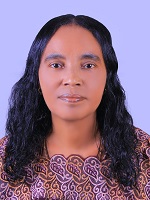Due to copyright issues, an electronic copy of the thesis must be ordered from the faculty. For the faculty to have time to process the order, the order must be received by the faculty at the latest 2 days before the public defence. Orders received later than 2 days before the defence will not be processed. After the public defence, please address any inquiries regarding the thesis to the candidate.
Trial Lecture – time and place
See Trial Lecture.
Adjudication committee
- First opponent: Associate Professor Daniel Gemechu Datilko, UiB - University of Bergen,
- Second opponent: Professor Brita Askeland Winje, OsloMet - Oslo Metropolitan University,
- Third member and chair of the evaluation committee: Researcher Tony Joakim Ananiassen Sandset, University of Oslo
Chair of the Defence
Associate Professor Lumbwe Chola, University of Oslo
Principal Supervisor
Professor Mette Sagbakken, OsloMet - Oslo Metropolitan University
Summary
Tuberculosis (TB) is a global public health problem. The World Health Organization has developed the End TB Strategy to end the global TB epidemic by 2035. Achieving the End TB targets requires the establishment of efficient and well-resourced TB control programs. Yet, there are various challenges to the performance of TB control programs. Addressing these challenges is crucial to the success of the Strategy.
The aim of this thesis was to assess the challenges and associated factors of TB control program performance by identifying barriers to TB case finding; by determining the length and factors associated with total delay; by comparing TB treatment outcome among patients treated with community-based directly observed treatment, short course versus facility-based directly observed treatment, short course; and by assessing determinants of unfavorable treatment outcome. Data were collected in Jimma Zone, Ethiopia with mixed methods.
Inadequate resources for TB diagnostic services and limited access to diagnostic services were identified as major challenges to TB case finding.
When compared in terms of treatment outcome, community-based directly observed treatment, short course was as effective as facility-based directly observed treatment, short course. Women and illiterate patients preferred community-based treatment.
The median TB total delay was 35 days and this delay was associated with poor knowledge of TB, swelling or wounds in the neck region, being female, low level of education, and low household income.
Overall, 86.9% of TB patients had favorable and 5.7% had unfavorable treatment outcomes. Being female, low household income, stigma and alcohol consumption were identified as determinants of unfavorable treatment outcome.
Generally, early case detection and prompt treatment of TB, as well as increased scale-up and decentralization of services, are essential to improve the performance of TB control programs and ultimately achieve the targets of ending TB.
Additional information
Contact the research support staff.
